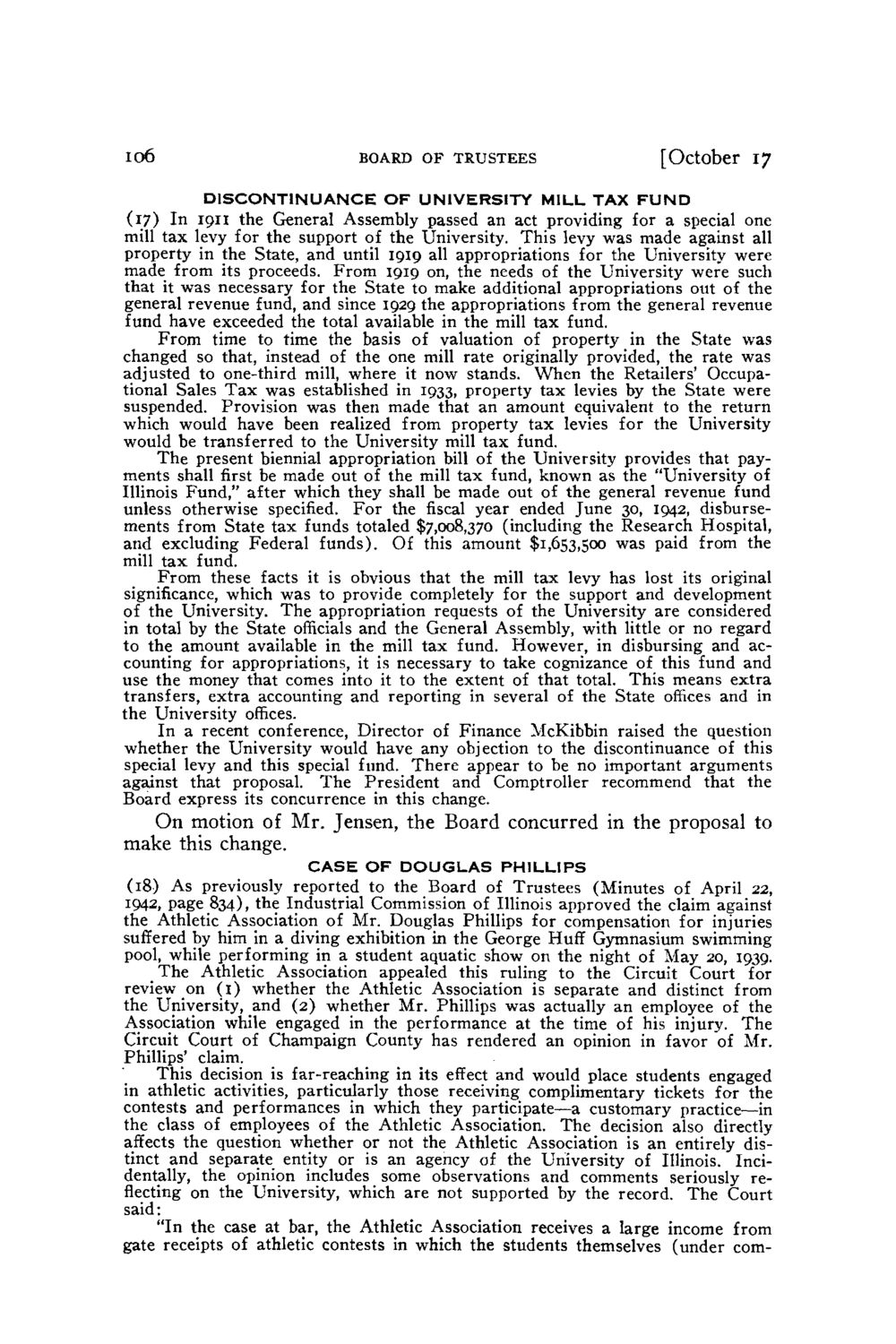| |
| |
Caption: Board of Trustees Minutes - 1944
This is a reduced-resolution page image for fast online browsing.

EXTRACTED TEXT FROM PAGE:
io6 BOARD O F TRUSTEES [October 17 DISCONTINUANCE O F UNIVERSITY MILL TAX F U N D (17) In 1911 the General Assembly passed an act providing for a special one mill tax levy for the support of the University. This levy was made against all property in the State, and until 1919 all appropriations for the University were made from its proceeds. F r o m 1919 on, the needs of the University were such that it was necessary for the State to make additional appropriations out of the general revenue fund, and since 1929 the appropriations from the general revenue fund have exceeded the total available in the mill tax fund. From time to time the basis of valuation of property in the State was changed so that, instead of the one mill rate originally provided, the rate was adjusted to one-third mill, where it now stands. When the Retailers' Occupational Sales T a x was established in 1933, property tax levies by the State were suspended. Provision was then made that an amount equivalent to the return which would have been realized from property tax levies for the University would be transferred to the University mill tax fund. T h e present biennial appropriation bill of the University provides that payments shall first be made out of the mill tax fund, known as the "University of Illinois Fund," after which they shall be made out of the general revenue fund unless otherwise specified. F o r the fiscal year ended June 30, 1942, disbursements from State tax funds totaled $7,008,370 (including the Research Hospital, and excluding Federal funds). Of this amount $1,653,500 was paid from the mill t a x fund. F r o m these facts it is obvious that the mill tax levy has lost its original significance, which was to provide completely for the support and development of the University. T h e appropriation requests of the University are considered in total by the State officials and the General Assembly, with little or no regard to the amount available in the mill tax fund. However, in disbursing and accounting for appropriations, it is necessary to take cognizance of this fund and use the money that comes into it to the extent of that total. This means extra transfers, extra accounting and reporting in several of the State offices and in the University offices. In a recent conference, Director of Finance McKibbin raised the question whether the University would have any objection to the discontinuance of this special levy and this special fund. T h e r e appear to be no important arguments against that proposal. T h e President and Comptroller recommend that the Board express its concurrence in this change. On motion of Mr. Jensen, the Board concurred in the proposal to make this change. CASE OF DOUGLAS PHILLIPS (18) As previously reported to the Board of Trustees (Minutes of April 22, 1942, page 834), the Industrial Commission of Illinois approved the claim against the Athletic Association of Mr. Douglas Phillips for compensation for injuries suffered by him in a diving exhibition in the George Huff Gymnasium swimming pool, while performing in a student aquatic show on the night of May 20, 1939. The Athletic Association appealed this ruling to the Circuit Court for review on (1) whether the Athletic Association is separate and distinct from the University, and (2) whether Mr. Phillips was actually an employee of the Association while engaged in the performance at the time of his injury. T h e Circuit Court of Champaign County has rendered an opinion in favor of Mr. Phillips' claim. This decision is far-reaching in its effect and would place students engaged in athletic activities, particularly those receiving complimentary tickets for the contests and performances in which they participate—a customary practice—in the class of employees of the Athletic Association. The decision also directly affects the question whether or not the Athletic Association is an entirely distinct and separate entity or is an agency of the University of Illinois. Incidentally, the opinion includes some observations and comments seriously reflecting on the University, which are not supported by the record. The Court said: "In the case at bar, the Athletic Association receives a large income from gate receipts of athletic contests in which the students themselves (under com-
| |